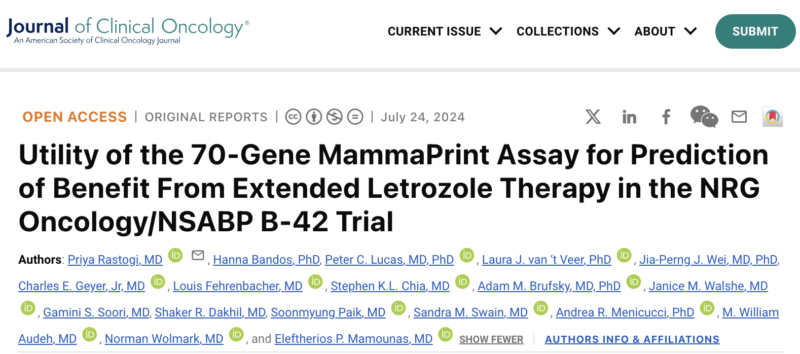Piotr Wysocki recently posted on LinkedIn:
“A recent study published in the Journal of Clinical Oncology assessed the utility of the 70-gene MammaPrint (MP) assay in predicting the benefit of extended letrozole therapy (ELT) for patients with early-stage breast cancer. The study involved 1,866 patients who were part of the NSABP B-42 trial and were randomly assigned to receive either ELT or a placebo.
The primary endpoint was distant recurrence (DR), while secondary endpoints included disease-free survival (DFS) and breast cancer-free interval (BCFI). Tumors were categorized into MP high risk (MP-HR) and low risk (MP-LR), with MP-LR further divided into ultralow risk (MP-UL) and low non-ultralow risk (MP-LNUL).
Results showed no significant difference in ELT benefit on DR between MP-HR and MP-LR groups (interaction P = .38). However, MP-LR tumors exhibited a statistically significant 10-year benefit for DR (3.7%), DFS (7.8%), and BCFI (7.0%). In contrast, MP-HR tumors did not show a significant benefit from ELT. Further exploratory analysis indicated that MP-LNUL tumors had a more pronounced 10-year benefit from ELT than MP-UL tumors.
The study concluded that while the primary hypothesis of MP’s predictive ability on DR was not confirmed, secondary outcomes demonstrated that MP could predict ELT response.
These findings are indeed not surprising. MammaPrint, like OncotypeDX, has been designed to identify patients at high risk of relapse who require adjuvant chemotherapy. In such cases, it is chemotherapy that is mainly responsible for decreasing the risk of relapse (which in aggressive tumors is a relatively early event). On the other hand, in low-risk patients who require endocrine therapy alone, the risk of relapse increases with time.
Accordingly, the benefit of extended adjuvant endocrine therapy should be expected solely in patients at higher clinical risk (locally advanced disease, N+) who are not treated with adjuvant chemotherapy due to low genomic risk.”
Source: Piotr Wysocki/LinkedIn
Authors: Priya Rastogi, Hanna Bandos, Peter C. Lucas, Laura J. van ‘t Veer, Jia-Perng J. Wei, Charles E. Geyer, Jr, Louis Fehrenbacher, Stephen K.L. Chia, Adam M. Brufsky, Janice M. Walshe, Gamini S. Soori, Shaker R. Dakhil, Soonmyung Paik, Sandra M. Swain, Andrea R. Menicucci, M. William Audeh, Norman Wolmark, and Eleftherios P. Mamounas

About Piotr Wysocki
Piotr Wysocki leads the Clinical Oncology Department at University Hospital and the Faculty of Oncology at Jagiellonian University-Medical College in Krakow, Poland. As an advisor to the Polish Ministry of Health, he shapes the national cancer strategy.
His clinical expertise spans the systemic treatment of breast, gynecologic, and genitourinary cancers, with a focus on developing innovative metronomic chemotherapy-based therapies for advanced cancer patients who have undergone prior treatment.
Read other posts by Piotr Wysocki published on OncoDaily.


